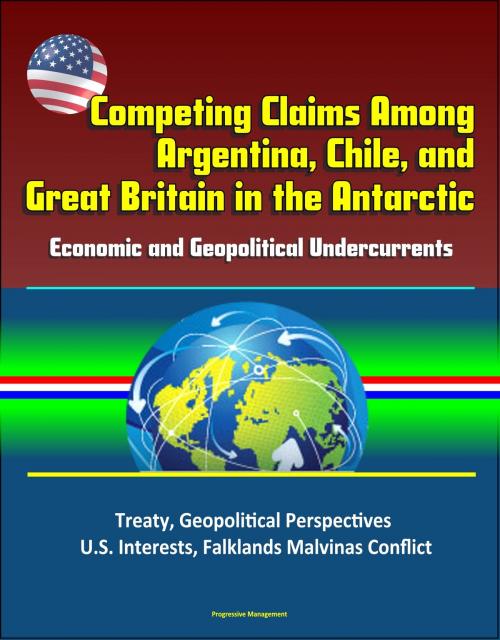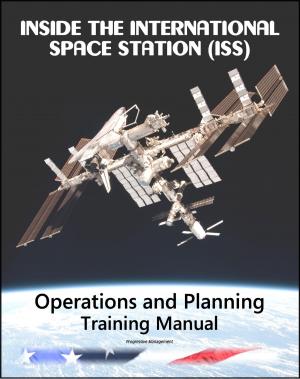Competing Claims Among Argentina, Chile, and Great Britain in the Antarctic: Economic and Geopolitical Undercurrents - Treaty, Geopolitical Perspectives, U.S. Interests, Falklands Malvinas Conflict
Nonfiction, History, Polar Regions, Americas, Latin America| Author: | Progressive Management | ISBN: | 9781310054228 |
| Publisher: | Progressive Management | Publication: | July 1, 2016 |
| Imprint: | Smashwords Edition | Language: | English |
| Author: | Progressive Management |
| ISBN: | 9781310054228 |
| Publisher: | Progressive Management |
| Publication: | July 1, 2016 |
| Imprint: | Smashwords Edition |
| Language: | English |
This excellent report has been professionally converted for accurate flowing-text e-book format reproduction. The Antarctic continent holds a vast economic potential in both renewable and non-renewable resources. Therefore, the sovereignty of the continent, and in particular the Antarctic peninsula and Weddell Sea areas, has been a key issue between the two Southern Cone nations of Argentina and Chile for hundreds of years. Currently these two nations, along with Great Britain, have overlapping claims in the region. This thesis examines the geopolitical and historical claims of these and other nations, along with the current and potential mechanisms that are designed to regulate the region. It will also evaluate the potential for conflict in the future over the disputed region and examines current U.S. interests. It concludes that the United States should make every effort to maintain the current Antarctic Treaty System.
CHAPTER I - INTRODUCTION * CHAPTER II - THE ANTARCTIC TREATY * A. HISTORICAL PERSPECTIVE * B. THE INTERNATIONAL GEOPHYSICAL YEAR * C. THE TREATY * CHAPTER III - THE ECONOMIC SIGNIFICANCE OF ANTARCTICA * A. RENEWABLE RESOURCES * B. NON-RENEWABLE RESOURCES * C. THE WELLINGTON CONVENTION * CHAPTER IV - COMPETING CLAIMS * A. BACKGROUND. * B. ARGENTINE CLAIMS * C. CHILEAN CLAIMS * D. BRITISH CLAIMS * CHAPTER V - GEOPOLITICAL PERSPECTIVES * A. ARGENTINE GEOPOLITICAL VIEWS * B. CHILEAN GEOPOLITICAL VIEWS * C. BRAZILIAN GEOPOLITICAL VIEWS * CHAPTER VI - STRATEGIC ASPECTS OF THE INSULAR REGIONS * A. THE BEAGLE CHANNEL CONFLICT * B. THE PEACE AND FRIENDSHIP TREATY OF 1982 * CHAPTER VII - THE FALKLANDS/MALVINAS CONFLICT * A. THE ARGENTINA GOVERNMENT IN 1981 * B. ECONOMIC INDICATORS OF 1981 * C. HUMAN RIGHTS PROBLEMS * CHAPTER VIII - UNITED STATES INTERESTS IN THE ANTARCTIC * A. MAINTENANCE OF THE ATS * B. THE RIO TREATY * CHAPTER IX - CONCLUSION
This excellent report has been professionally converted for accurate flowing-text e-book format reproduction. The Antarctic continent holds a vast economic potential in both renewable and non-renewable resources. Therefore, the sovereignty of the continent, and in particular the Antarctic peninsula and Weddell Sea areas, has been a key issue between the two Southern Cone nations of Argentina and Chile for hundreds of years. Currently these two nations, along with Great Britain, have overlapping claims in the region. This thesis examines the geopolitical and historical claims of these and other nations, along with the current and potential mechanisms that are designed to regulate the region. It will also evaluate the potential for conflict in the future over the disputed region and examines current U.S. interests. It concludes that the United States should make every effort to maintain the current Antarctic Treaty System.
CHAPTER I - INTRODUCTION * CHAPTER II - THE ANTARCTIC TREATY * A. HISTORICAL PERSPECTIVE * B. THE INTERNATIONAL GEOPHYSICAL YEAR * C. THE TREATY * CHAPTER III - THE ECONOMIC SIGNIFICANCE OF ANTARCTICA * A. RENEWABLE RESOURCES * B. NON-RENEWABLE RESOURCES * C. THE WELLINGTON CONVENTION * CHAPTER IV - COMPETING CLAIMS * A. BACKGROUND. * B. ARGENTINE CLAIMS * C. CHILEAN CLAIMS * D. BRITISH CLAIMS * CHAPTER V - GEOPOLITICAL PERSPECTIVES * A. ARGENTINE GEOPOLITICAL VIEWS * B. CHILEAN GEOPOLITICAL VIEWS * C. BRAZILIAN GEOPOLITICAL VIEWS * CHAPTER VI - STRATEGIC ASPECTS OF THE INSULAR REGIONS * A. THE BEAGLE CHANNEL CONFLICT * B. THE PEACE AND FRIENDSHIP TREATY OF 1982 * CHAPTER VII - THE FALKLANDS/MALVINAS CONFLICT * A. THE ARGENTINA GOVERNMENT IN 1981 * B. ECONOMIC INDICATORS OF 1981 * C. HUMAN RIGHTS PROBLEMS * CHAPTER VIII - UNITED STATES INTERESTS IN THE ANTARCTIC * A. MAINTENANCE OF THE ATS * B. THE RIO TREATY * CHAPTER IX - CONCLUSION















